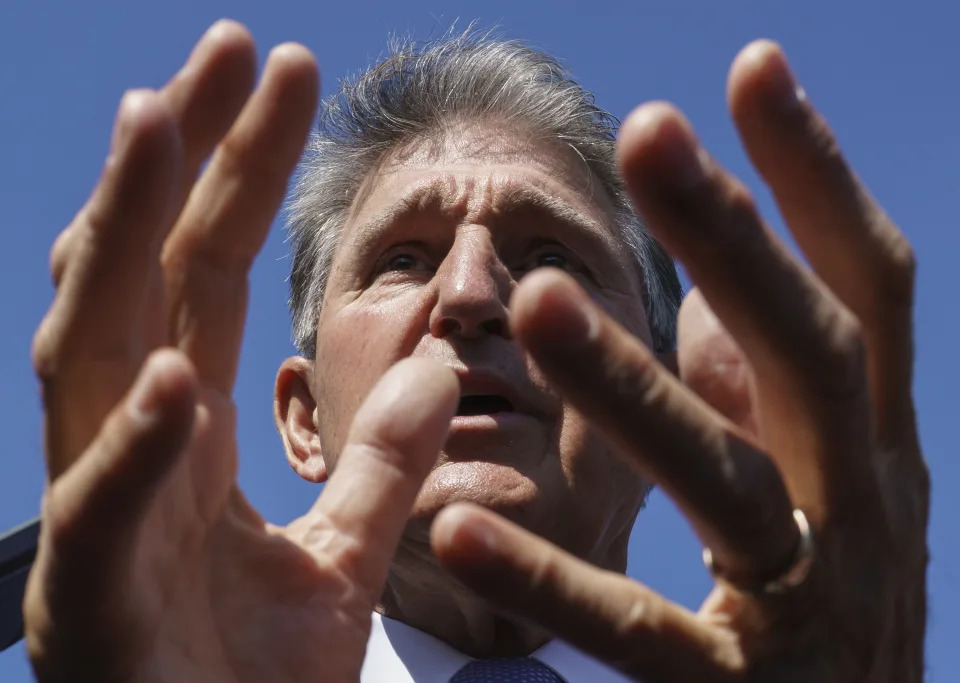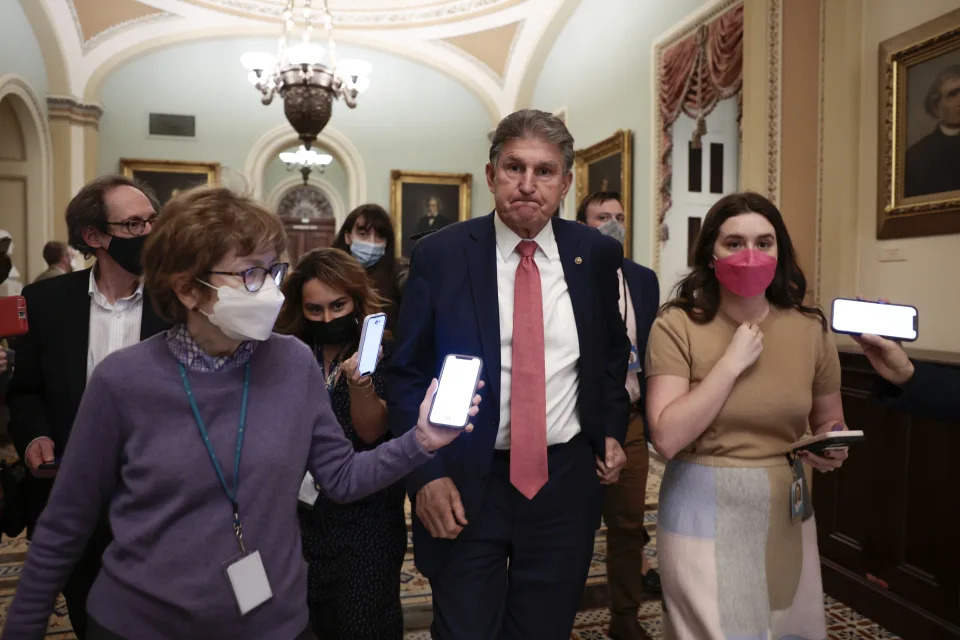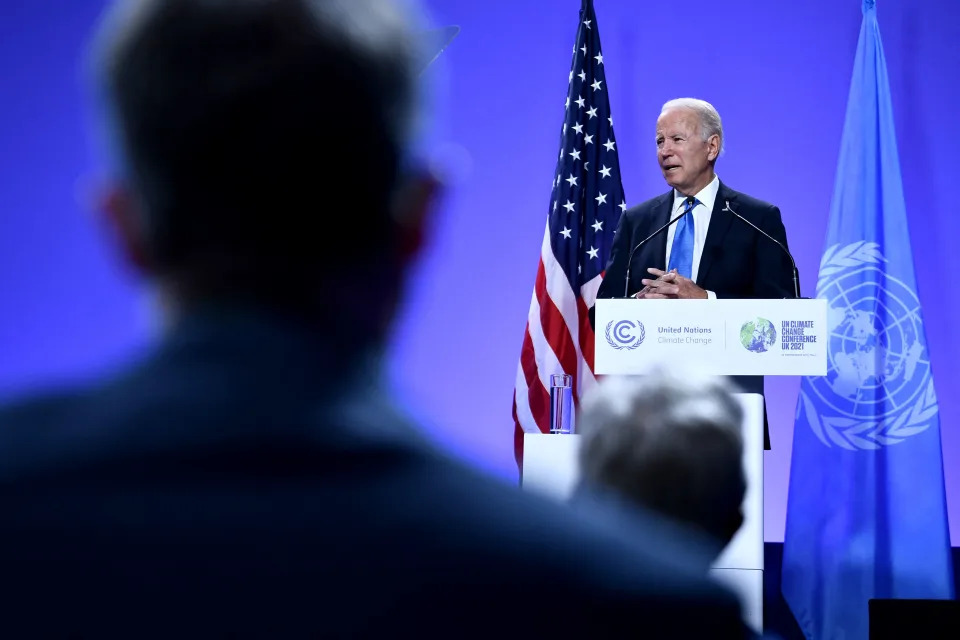the let's blame Manchin game begins if covid don't kill us Manchin will!
BAHHAHHAHAAAAA
 Manchin killing Build Back Better is 'devastating' to climate change action, experts say
https://www.yahoo.com/news/manchin-k...194208325.html
Ben Adler
Manchin killing Build Back Better is 'devastating' to climate change action, experts say
https://www.yahoo.com/news/manchin-k...194208325.html
Ben Adler·Senior Climate Editor
Mon, December 20, 2021, 1:42 PM

When Sen. Joe Manchin, D-W.Va., announced on Fox News
on Sunday that he won’t vote for the current version of Build Back Better, experts predicted he may have single-handedly killed the world’s best hope of avoiding catastrophic climate change.
In order to avoid breaching the 1.5 degrees Celsius threshold that will trigger a cascade of devastating effects, the Intergovernmental Panel on Climate Change has said that global emissions of the greenhouse gasses that cause climate change
must be cut in half by 2030, with emissions reaching net zero by 2050.
President Biden committed the United States — the world’s second-largest emitting country currently, and the largest historically — to reaching those goals and laid out a plan to achieve it. It was centered around Build Back Better’s
unprecedented $555 billion in spending to subsidize transitioning the country to clean sources of energy and electric vehicles.
Without those actions, according to modeling by experts, the U.S.
likely won’t hit its targets. And if the U.S. isn’t on pace to hit its targets, that will undermine the whole global push to switch to clean energy and cut emissions.
“We won’t be acting on the climate crisis if we don’t pass this bill, and there’s not a decade left to waste,” Leah Stokes, a climate policy professor at the University of California, Santa Barbara,
told Vox.
Princeton engineering professor Jesse Jenkins, who studies electricity policy, tweeted a
one-word response to Manchin’s comments: “devastating.”

Sen. Joe Manchin, D-W.Va., speaking to the media in September. (J. Scott Applewhite/AP)
“It’s in everyone’s interest for the U.S. to slash emissions. As the second-largest polluter of greenhouse gasses in the world, that’s fundamental to solving the problem,” Pete Ogden, vice president for energy, climate, and the environment at the U.N. Foundation, told Yahoo News. “And because we have an amazing ability to shape the markets in such a way as to drive innovation, and with our market locked in, as the Biden administration has been trying to do to this clean energy future, that’s going to have a global impact on clean energy markets.”
Environmental activists and experts such as Ogden have not given up on the prospect that the U.S. could still meet its emissions targets, however. Some hold out hope that Manchin, the conservative Democrat from a coal- and gas-heavy state, can still be persuaded to vote for a revised version of the bill.
“This is not the end of the road,” said League of Conservation Voters senior vice president Tiernan Sittenfeld
in a statement. “We are more determined than ever, and we will keep fighting like hell to ensure the Build Back Better Act becomes law — for the people of West Virginia and for all people in this country who care deeply about climate, jobs, and justice.”
Green groups are also trying to figure out alternative ways of getting sufficiently ambitious climate policies in place through separate legislation or regulations adopted by federal agencies such as the Environmental Protection Agency.

Manchin is followed by reporters as he leaves a caucus meeting with Senate Democrats at the Capitol on Friday. (Anna Moneymaker/Getty Images)
“This is a clear signal that the administration must pursue big and bold efforts across the federal government to achieve as much as possible on climate & clean energy action, clean air and clean water by utilizing its robust executive branch authority,” Sierra Club legislative director Melinda Pierce told Yahoo News in an emailed statement. “In tandem, we are confident that the Biden Administration will work on a legislative path forward on climate and clean energy, because we must deliver on our international commitments.”
Given the evenly divided Senate, whether the U.S. could live up to its international commitments is an unanswered question. Throughout the U.N. Climate Change Conference in Glasgow, Scotland, last month, Biden administration officials and Democratic leaders in Congress repeated three words as if it were an almost magical mantra: Build Back Better. Nearly every U.S.-sponsored event amounted to a primer on what the bill would deliver. Based in part on its climate change provisions, special envoy for climate John Kerry negotiated joint climate actions with a number of other large nations, including China, the No. 1 emitter.
While the national commitments made at the Glasgow conference, also known as COP26,
fell short of what is needed to stay below 1.5C, climate scientists and activists hope that next year’s conference, COP27, will see nations return with more ambitious pledges. That’s a lot less likely to happen if the country most responsible for climate change fails to pass the bill it touted at COP26 and isn’t clearly on a path to fulfilling its pledges.

President Biden addresses a press conference at the U.N. Climate Change Conference in November. (Brendan Smialowski/AFP via Getty Images)
“This is a huge lost opportunity, not to get this thing passed right now, before the holidays and before the end of the year, so that the administration would have a full year of running room [before COP27],” Ogden said.
Ogden argued, however, that Biden can find a way to show the U.S. is on the way to slashing its emissions.
“There are still multiple paths ahead and time to get things moving in the right direction before the next COP,” Ogden said.
For example, Ogden noted that the U.S.’s pledge to reduce emissions of methane, a powerful greenhouse gas, by 30 percent by 2030 is not solely contingent on the methane-focused components of Build Back Better, which are subsidies for oil and gas well operators to adopt advanced methane-control technologies and fees for those who continue to leak excessive methane. The EPA is also
writing regulations that would clamp down on methane emissions.
“One of the major initiatives that the administration has been driving globally is a methane reduction pledge,” Ogden said. “That’s something that the administration has already set in motion, with a domestic regulatory framework to achieve that. So I think that’s going forward.”
On Monday, the EPA announced that it had finalized new rules raising the average fuel efficiency of cars and light trucks. As long as the U.S. finds a way of getting the cuts it promised, the administration can keep leading the charge on global climate diplomacy, Ogden argued.
“I think that the rest of the world isn’t ultimately concerned about whether the climate action the United States takes is via Build Back Better or some other suite of actions, legislative and regulatory,” he said.
_____
Global temperatures are on the rise and have been for decades, step inside the data and see the magnitude of climate change.
 For more Immersive stories click here.
For more Immersive stories click here.
